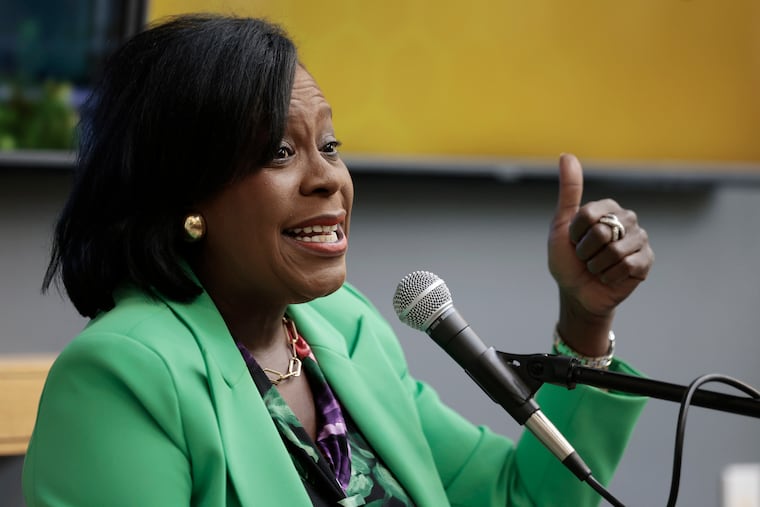What Philly’s Democratic Party’s sample ballots tell us about Tuesday’s primary
Clout breaks down the Democratic City Committee’s sample ballots, showing which candidates for several offices are receiving support in Philadelphia’s 69 wards during Tuesday's primary election.

Voters entering polling places Tuesday to cast ballots in the primary election will likely encounter at least one person handing out “sample ballots” suggesting which candidates they should support.
Clout obtained the Democratic City Committee’s breakdown of which candidates are receiving support in Philadelphia’s 69 wards.
Mayor: Former City Councilmember Cherelle Parker is the party’s overwhelming favorite in this race. Her name will appear on sample ballots in 43 wards — nearly two-thirds of the city.
That’s a major lead on her former Council colleagues, Allan Domb (seven wards) and Helen Gym (four wards.) Former City Controller Rebecca Rhynhart got five wards. Three wards split between Parker and Domb, listing both, and five wards made no recommendation for mayor.
Sheriff: Rochelle Bilal has had a bumpy ride in her controversy-strewn bid for a second term but the Democratic Party has her back. She will be listed on sample ballots in 43 wards. Michael Untermeyer, who has railed about Bilal’s controversies, is on 17 ballots, about a quarter of the city. Nine wards listed no preference for sheriff.
Register of Wills: Here, Tracey Gordon’s history of tussling with her own party shows up in dramatic fashion. The Democratic City Committee endorsed John Sabatina Sr., a lawyer and Northeast Philly ward leader who appears on 56 ballots — more than 80% of the city.
Gordon is on just nine sample ballots. Another Democrat, Elizabeth Lowe, got one ballot. Three wards listed no preference.
City Council at-large: City Councilmember Kathy Gilmore Richardson nabs a perfect score here, with her name listed on sample ballots in all 69 wards. She is followed by Council colleagues Isaiah Thomas (64 wards) and Jimmy Harrity (60 wards.)
They were endorsed by the party, along with Rue Landau, who got 40 wards.
There are five at-large seats, so wards could also plug in one of three party-approved names for the final spot — Nina Ahmad, Erika Almirón, or Eryn Santamoor.
Santamoor got 42 wards while Ahmad got 35 wards and they split one ward. Almiron got eight wards while Amanda McIllmurray, who is not endorsed by the party, took five wards.
A few wards dropped endorsed candidates for other picks or made no recommendations.
Clout’s two caveats: Sample ballots swing more weight in low-information, low-turnout elections. Spending in this competitive primary on the mayor’s race alone has topped $31 million. That means plenty of voters are already paying attention.
And sample ballot shenanigans are likely in competitive races. Look out for bogus sample ballots printed with fake disclaimers about where they came from. If you find one, send Clout a photo — clout@inquirer.com.
Rochelle Bilal’s Sheriff’s Office swag
Bilal spent part of Sunday at the always-packed Southeast Asian Market in South Philly’s FDR Park, passing out cards that told her life story and declared her “the highest ranking law enforcement officer” in the city.
That wasn’t literature from her campaign. They were baseball-style “trading cards” paid for by the Sheriff’s Office with public funds.
Bilal, standing under a blue tent emblazoned with her office’s name and giant badges, passed out plenty of swag, including keychains and backpacks bearing the same symbols. All of that was also purchased with public funds.
Sounds like a good way to boost name recognition for a candidate, nine days before a primary with Untermeyer, who has much deeper pockets.
Bilal spokesperson Teresa Lundy defended using public funds to boost name recognition, telling Clout “it is important for members of the community to know who leads the Sheriff’s Office, her qualifications, and to put a face to the name.”
Lodge 5 of the Fraternal Order of Police, which gave Bilal $5,000 this year, conducted a poll last month that found 14% of likely Democratic voters had a favorable opinion of Bilal while 10% had an unfavorable opinion and 75% had no opinion or no idea who she was.
Imagine running for reelection in a primary where three out of four voters shrug when they hear your name.
Lundy said Bilal and the uniformed deputies helping her hand out the sheriff’s swag Sunday also distributed information about how the office operates, gun safety, and how proceeds for homes sold in foreclosure are distributed.
Jimmy DeLeon’s viability conundrum
What’s a candidate for mayor in Philadelphia to do when they can’t raise much money, barely register in the polling, and fail to draw the same kind of media attention as the front-runners?
Step 1: Paint yourself as a victim on social media.
Step 2: Get the feds involved.
Jimmy DeLeon, a retired Municipal Court judge, has spent weeks publicly complaining about not being treated as a “viable” candidate for mayor in Tuesday’s Democratic primary.
He took that grievance to the Federal Communications Commission, filing complaints Tuesday that accuse two television stations and a radio station — 6ABC, CBS3, and KYW Newsradio — of violating the federal “equal time” rule by excluding him from broadcast debates.
DeLeon said he was not invited to the April 25 6ABC debate. He was invited and then disinvited to an April 29 debate hosted by CBS3 and a KYW debate on May 4.
DeLeon has raised a little under $75,000 in a primary where spending has already exceeded $31 million.
A poll released on April 28 showed DeLeon registered support from just 2% of the likely primary voters surveyed.
Clout provides often irreverent news and analysis about people, power, and politics.